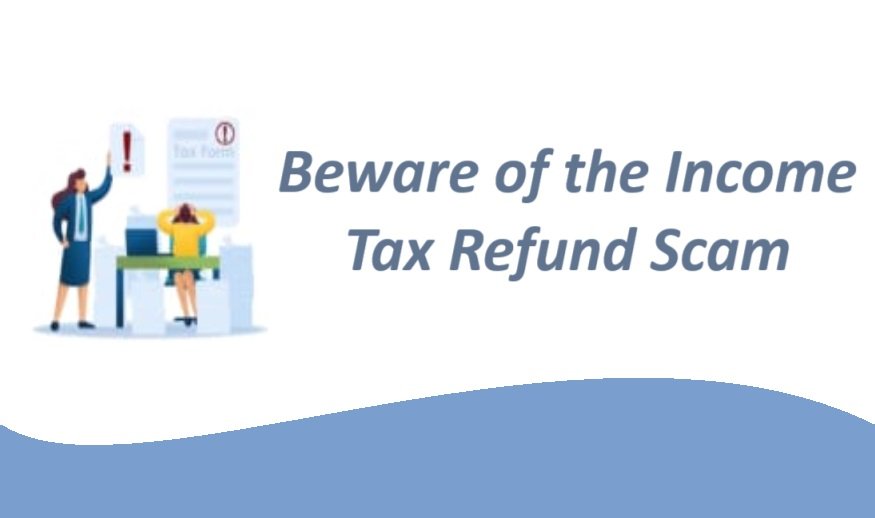Beware of the Income Tax Refund Scam in India
In this article, We discuss Income Tax Refund Scam in India. As you know the new financial year(2024-25) is about to start. Many fraudsters can commit fraud in the name of income tax refund. How can you protect yourself from this, let’s discuss it.
What is the Income Tax Refund Scam in India?
Income tax refund scams are a type of fraudulent activity where scammers try to deceive individuals into providing their personal and financial information in order to steal their tax refunds. These scams typically occur during tax season when people are expecting to receive their refunds from the government.
Scammers use various tactics to trick unsuspecting victims, such as sending fake emails or making phone calls pretending to be from the Income Tax Department (ITD) of India or other tax authorities of India. They may claim that there is an issue with the individual’s tax return or that they are eligible for a larger refund, luring them into providing sensitive information.
These scammers are becoming increasingly sophisticated in their methods, making it more challenging for individuals to identify and avoid falling victim to these scams. They may use official-looking logos and email addresses that closely resemble those of legitimate tax authorities, making it difficult to differentiate between a genuine communication and a scam.
In addition to email and phone scams, scammers may also use social engineering techniques to manipulate individuals into providing their personal and financial information. They may pose as tax professionals or representatives from reputable organizations, offering assistance with tax filing or promising to expedite the refund process.
Once scammers have obtained the necessary information, they can use it to file fraudulent tax returns on behalf of the victims, claiming their refunds and leaving the victims to deal with the consequences. This can result in financial loss, identity theft, and a lengthy and complicated process to resolve the issue with the tax authorities.
To protect yourself from income tax refund scams, it is important to be vigilant and cautious when providing personal and financial information. The Income Tax Department (ITD) of India and other tax authorities will never contact individuals via email or phone to request sensitive information, such as Social Security numbers or bank account details. It is important to verify the legitimacy of any communication before responding or providing any information.
If you receive a suspicious email or phone call claiming to be from the Income Tax Department (ITD) of India or a tax authority, do not provide any information and report it to the appropriate authorities. It is also advisable to regularly monitor your financial accounts and credit reports for any unusual activity.
By staying informed and being proactive in protecting your personal and financial information, you can reduce the risk of falling victim to income tax refund scams and ensure a safe and secure tax filing experience.
Please explore my articles related to awareness of online Fraud.
Red flag to check to identify Income Tax Refund Scam
While income tax refund scams can be sophisticated, there are certain red flags that can help you identify them:
Unsolicited communication: Be cautious if you receive an unexpected email, text message, or phone call regarding your tax refund. The IRS typically contacts individuals through official mail. If you do receive such communication, it is important to verify its legitimacy before taking any action. You can contact the Income Tax Department (ITD) of India directly using the contact information provided on their official website to confirm if the communication is genuine.
Urgency and threats: Scammers often create a sense of urgency and use threats to pressure individuals into providing their personal information. The Income Tax Department (ITD) of India does not use such tactics and will never threaten you with arrest or legal action. If you receive a communication that seems overly urgent or threatening, it is likely a scam. Take the time to carefully evaluate the situation and do not let yourself be coerced into providing any personal or financial information.
Request for personal information: The Income Tax Department (ITD) does not initiate contact via email or phone to request personal or financial information. If you are asked to provide your Social Security number, bank account details, or other sensitive data, it is likely a scam. The IRS already has access to the necessary information and will not need to ask you for it. If you are unsure about the legitimacy of a request for personal information, it is best to err on the side of caution and refrain from providing any details.
Poor grammar and spelling: Many scam emails and messages contain spelling mistakes, grammatical errors, or awkward phrasing. This can be a sign that the communication is not legitimate. Scammers may not have the same attention to detail as official organizations, so be on the lookout for any language errors that could indicate a scam.
Unsecured websites: If you are directed to a website to provide your information, check if it is secure. Look for “https” in the URL and a padlock icon in the address bar. Scammers often use unsecured websites to collect personal data. Secure websites encrypt the information you enter, making it more difficult for unauthorized individuals to access it. If a website does not have these security measures in place, it is best to avoid entering any personal information on it.
By being aware of these red flags and staying vigilant, you can protect yourself from falling victim to income tax refund scams. Remember to always verify the legitimacy of any communication or request for personal information before taking any action. If you suspect that you have encountered a scam, report it to the appropriate authorities immediately.
Tips to protect yourself for Income Tax Refund Scam
Protecting yourself from the Income Tax Refund Scam requires vigilance and caution. Here are some tips to help safeguard your personal and financial information:
Verify the Source: Before responding to any communication regarding tax refunds, independently verify the legitimacy of the sender. Contact the Income Tax Department (ITD) or your tax preparation service directly using verified contact information to confirm the authenticity of the message.
Guard Personal Information: Never share personal or financial information with unknown or unverified entities. Be cautious when asked to provide sensitive data, and only do so through secure channels or websites.
Use Secure Channels: When communicating with tax agencies or financial institutions, ensure that you are using secure channels of communication, such as official websites or encrypted email services.
Stay Informed: Stay informed about common scams and fraud schemes circulating during tax season. Knowledge is your best defense against falling victim to fraudulent activities.
Report Suspicious Activity: If you encounter a suspected scam or fraudulent communication, report it to the appropriate authorities, such as the Income Tax Department (ITD).
Stay Connected with ITD India: Always use official website and Use Contact number or other digital communication methods provided by ITD India. Visit: https://www.incometax.gov.in/iec/foportal/help
You may also like: Decoding AI Sector’s Union Budget 2024 Wishlist for a Technological Renaissance
Conclusion
Disclaimer: This blog is solely for educational purposes.




